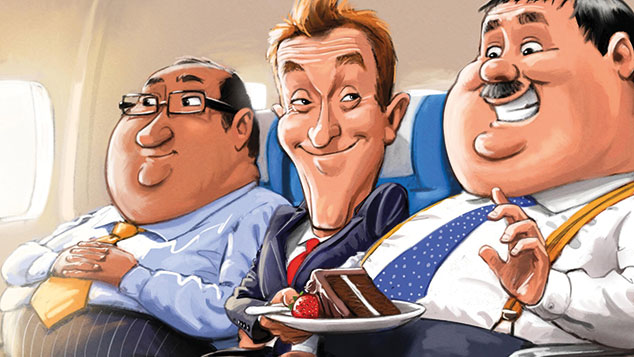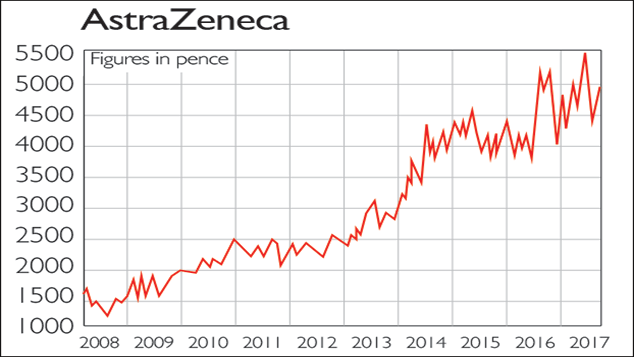How to profit as Britain piles on the pounds
The world is getting fatter – and with no easy solution to obesity in sight, investing in healthcare providers and food and drink makers could bring big gains, says Jonathan Compton.
Get the latest financial news, insights and expert analysis from our award-winning MoneyWeek team, to help you understand what really matters when it comes to your finances.
You are now subscribed
Your newsletter sign-up was successful
Want to add more newsletters?

Twice daily
MoneyWeek
Get the latest financial news, insights and expert analysis from our award-winning MoneyWeek team, to help you understand what really matters when it comes to your finances.

Four times a week
Look After My Bills
Sign up to our free money-saving newsletter, filled with the latest news and expert advice to help you find the best tips and deals for managing your bills. Start saving today!

The world is getting fatter and with no easy solution to obesity in sight, investing in healthcare providers and food and drink makers could bring big gains, says Jonathan Compton.
Obesity is a very visible problem around the world, and it's getting worse. Put bluntly, people are getting fatter. However, poor science and contradictory data combined with feeble political decision-making and various taboos around weight have created a fog of confusion and misguided responses. The first point to note is that our obesity epidemic is not all down to our eating habits. We are forever being urged to cut back on the number of calories we eat, especially carbohydrates, sugars and fats. The fact is, we have and significantly. At the end of World War II, a period of real austerity, Britons were consuming about 2,900 calories a day. This was considered barely enough to keep the population alive and healthy. Now, according to government food and agriculture department Defra, we consume only 2,200 per day, down from over 2,400 in 2001.
The same downward trend occurs in politically unpopular "killer foods". Sugar consumption has fallen by 16% since 1992, salt by a quarter, and the intake of saturated fats by an enormous 41% since 1974. The British Heart Foundation noted in 2012 that falling sugar, fat and salt consumption was "accompanied by an increase in fibre and fruit and vegetable intake", ie, we are eating less and eating better. These consumption trends make a lot of authoritative research from well-meaning bodies read like propaganda. Research consistently claims that rising sugar, fat and calorie consumption (which is actually falling) is behind an increase in the rate of various cancers, diabetes and heart disease. This is "the sugar paradox": lower intake yet higher disease rates. What it demonstrates is that the over-emphasis on controlling food intake is misplaced. The key issue is how energy is expended.
MoneyWeek
Subscribe to MoneyWeek today and get your first six magazine issues absolutely FREE

Sign up to Money Morning
Don't miss the latest investment and personal finances news, market analysis, plus money-saving tips with our free twice-daily newsletter
Don't miss the latest investment and personal finances news, market analysis, plus money-saving tips with our free twice-daily newsletter
It's not what you eat it's what you do
We've long known that you get fat by consuming more calories than you burn. One aspect of this that has barely been researched is simple heat loss. Merely keeping warm in cold weather consumes more calories than walking and if it's really cold than running. Widespread central heating, sealed window units and insulation are relatively new the typical British home is now estimated to be about 3C warmer in winter than it was 30 years ago. Modern offices, public transport and schools are hotter too. Our cities, bars and restaurants provide year-round outdoor heaters. To ask house guests to bring a jersey would be considered highly eccentric. Everyone expects to be able to wear light clothes indoors at all times.
We burn very few calories to stay warm. Far more important than heating though is that we have entered an era of what can only be described as chronic laziness. According to Nice, the body that gives guidance on health issues to the NHS, 41% of adults between 40 and 60 do not even manage a single brisk 10-minute walk each month (excluding shopping or cruising from coffee shop to patisserie). NHS guidelines state that adults should have at least two and a half hours of moderate activity a week, such as walking rather than ambling; less than half of all adults exceed this low threshold. Broadcast regulator Ofcom estimates the average adult watches almost 30 hours of TV per week (which amounts to 64 days a year, excluding time on social media).
Then there is energy expended at work. Until this generation, many more people spent considerable time outdoors be it miners, milkmen or farmers and a greater proportion walked to work. Many of these occupations have gone or become warmer (modern tractor cabs are super-snug). The number of children walking to school has fallen from two-thirds to less than a fifth. The majority are driven to school, a quarter of those less than 700 yards.
A world-beating performance for Britain
How do Britons compare in the Global Lardy League? The most commonly used measurement of obesity is the Body Mass Index (BMI), a calculation based on height and weight. A BMI of above 25 is classed as overweight; above 30 obese; over 40, morbidly so. It's a dodgy metric, as it tends to overstate for short people and understate for the tall. Nor does it take account of differences in body composition such as considerable muscle which leaves the UK Olympian Matthew Pinsent, winner of four gold medals, classified as fat, along with many of the Olympic 2012 team. Those caveats aside, the verdict seems clear in Europe, Britain is the outright winner and the most sedentary.
The average British adult's weight has risen by six kilograms since 1993. Among the rich OECD nations, we rank in seventh place (interestingly, five of the top seven nations are English speaking). We're so huge that obesity in the UK per thousand people is five times greater than in Japan (and remember, the BMI tends to "punish" shorter people) and 2.5 times more than the Swiss or Norwegians. Our children are bulking up at record rates, hence dramatic headlines that they will be the first generation where significant numbers die before their parents. Around 10% are obese in reception year; double that by the final year of primary school.
Levels of incidence of obesity by occupation produce surprises too. The good news is that we are taking less sick leave in 2016, average sick leave fell to 4.3 days per worker, the lowest since records began in 1993 (although the trend of public-sector staff taking more sickies than private sector ones was maintained). Fat is a politically charged issue while the data breaks down the causes of sickness by type, there is no mention of weight. Thus diabetes will be recorded as a reason for absence, but not obesity, often the underlying cause. (Diabetes absorbs 10% of the NHS budget every year.) But even though weight is rarely used in any classification of physical or mental illness (imagine the outcry), there are interesting sub-sets of overweight occupations and correlations on a regional basis.
The NHS quietly admits that more than 700,000 "health professionals are overweight or obese", with nurses the worst, and Scotland especially bad. So too with the police. The Police Federation is often a reactionary body and substantially relaxed its fitness tests in the 1990s (the recently introduced new tests are not taxing). The result? In almost every force, around half are overweight, and about a quarter obese. Both nurses and police are slightly heavier than the population as a whole, which makes advising patients on their diets or chasing robbers farcical. If both groups were fitter, days lost and early retirement through being overweight again not measured could collapse and productivity soar. Spokesmen for both bodies imply without evidence that work stress is a cause of their obesity.
While both jobs can be extremely stressful, being overweight is not a problem in other extreme occupations such as front-line soldiers. Moreover, in America, where police obesity had reached genuine crisis levels, experiments in some states to reward (through pay and promotion) and punish (including reduced pensions and dismissal) has resulted in a marked improvement in morale and efficiency, reduced crime rates, headcount and costs.
The high price of chunky waistlines
What are the costs of obesity? Estimates vary considerably: £25bn a year, according to Health Secretary Jeremy Hunt; £45bn, say consultants McKinsey; or 3% of GDP, according to the World Health Organisation. Perhaps most interesting are NHS-sourced numbers, which show that the leanest fifth of the population as measured by BMI cost the health service about £800 per head a year, while the tubbiest cost nearly twice that. We'll never have accurate numbers but they are clearly substantial.
Reactions across the political spectrum are muddled and timorous, but, to be fair, it is unclear what should be done. The science is complex. People lay down fat in different ways, digestive effectiveness varies considerably from person to person, and so does the rate at which energy is burnt off. It is widely assumed that obesity is a poverty-related issue, but this is also too simplistic. True, obesity among men is highest in the lowest income groups and in the poorest regions, at about one-third. But among the wealthiest, and in the richest areas such as London, rates are also very high at around a quarter. Yet where the population takes exercise, even in poor areas, obesity is lower. There is also variance between ethnic groups, as well as a significant genetic component. Gay and bisexual men have been found to have a lower average BMI than heterosexual men. A better grasp of the science requires rigorous research into a wide range of taboo subjects (even more so than obesity), from ethnicity to sexual preference, all considered political suicide.
How can we slim down?
Everywhere in the world, food taxes, health campaigns, bullying and lecturing have produced minimal success. As long as food supplies remain in surplus, as has been the case for the last 30 years, and cheap (the percentage of household income spent on food has never been lower), it seems nothing can be done. Yet such despair ignores readily available, cheap options. More fresh air and lower house temperatures would save money (and ease certain breathing disorders). Schools remain an obvious starting point.
There is a case for universal free school meals with minimal choice and nothing brought from home, plus the reintroduction of health checks. Denial is another problem surveys show that about half of all parents with obese children consider their child's weight about right. St. Ninian's primary school in Scotland pioneered compulsory running or just strolling a mile every day, an experiment that is gradually expanding nationwide. The reported impact on physical/mental health and concentration has been significant.
Healthy eating and lifestyle are a habit; changes are cheap and should be encouraged. Far more can be done to promote walking, even by varying pensions and benefits or charging parents who drive short distances to school. When doctors refer overweight patients to gym classes there are measurable improvements; mild lectures do nothing. Most effective of all would be concerted pressure to change social attitudes. Smoking was mainstream at work, home and leisure 25 years ago; now it is reviled. The number of smokers has fallen significantly. Weight loss could be achieved but there's a real lack of political will, despite the many benefits. Hence I will continue to invest in greed.
Seven investments to buy into now
The problems created by an increasingly sedentary, heavier population won't go away soon, so healthcare funds remain an easy choice. The simplest, cheapest way to access the sector is via a global exchange-traded fund (ETF). The Lyxor MSCI World Health Care ETF (LSE: HLTG) tracks healthcare companies globally, based on each company's free float. Far more impressive has been the enviable record of a 227% return from the actively managed Worldwide Healthcare Trust (LSE: WWH). It has a market capitalisation of £1.2bn, a reasonable total expense ratio of 0.91%, and it trades at a small premium to its net asset value (the value of the underlying portfolio).

In anti-diabetes treatments, AstraZeneca (LSE: AZN) ranks number six globally, but the stock is significantly cheaper than the others for two reasons: it has failed to gain approvals for new oncology drugs, and there are concerns over the sustainability of its profits as various products come off patent and generic producers undercut prices. But the chief executive has made expansion of its diabetes division a priority. On 17 times earnings and a 4.5% yield, the problems seem to be in the price.
Excess weight combined with simple ageing put considerable pressure on the body's frame. The obvious play is Smith & Nephew (LSE: SN), a global leader in hip- and knee-joint replacement. It has spent several years expensively restructuring, but the recent half-year results showed stability at last and other important divisions, such as treatments for wounds, also performed well. Operating profit margins improved to 17.7%. After many fumbles, S&N should return to steady, if unspectacular, growth and warrants a mild re-rating.
There has been significant consolidation in "flavours and fragrances" companies that make a wide range of compounds to make food and cosmetics taste and smell better (or perhaps to make them more addictive). One of the cheapest is America's International Flavors & Fragrances (NYSE: IFF), an $11bn company that has been growing earnings per share at 13% a year.
I have a stake in Finnish food-processing group Raisio (Helsinki: RAIVV), which, with a market cap of €700m, is relatively small. It focuses on the development, manufacturing and marketing of health-promoting, vegetable-based foods. Its best-known brand in the UK is Benecol. Management has proved nimble at spotting trends in healthy eating. On a multiple of 16 and a 4.5% yield, I remain a happy holder.
People will keep slurping healthy and unhealthy liquids, hence my last suggestion is soft-drinks manufacturer Britvic (LSE: BVIC). It has reported sales growth across all markets, despite tough conditions and has already adapted to the weak (and pointless) threat of sugar taxes. It remains a well-known brand that, with its low-ish multiple of 15 times and 3.5% yield, makes it low risk.
Get the latest financial news, insights and expert analysis from our award-winning MoneyWeek team, to help you understand what really matters when it comes to your finances.
Jonathan Compton was MD at Bedlam Asset Management and has spent 30 years in fund management, stockbroking and corporate finance.
-
 Can mining stocks deliver golden gains?
Can mining stocks deliver golden gains?With gold and silver prices having outperformed the stock markets last year, mining stocks can be an effective, if volatile, means of gaining exposure
-
 8 ways the ‘sandwich generation’ can protect wealth
8 ways the ‘sandwich generation’ can protect wealthPeople squeezed between caring for ageing parents and adult children or younger grandchildren – known as the ‘sandwich generation’ – are at risk of neglecting their own financial planning. Here’s how to protect yourself and your loved ones’ wealth.
-
 Governments will sink in a world drowning in debt
Governments will sink in a world drowning in debtCover Story Rising interest rates and soaring inflation will leave many governments with unsustainable debts. Get set for a wave of sovereign defaults, says Jonathan Compton.
-
 Why Australia’s luck is set to run out
Why Australia’s luck is set to run outCover Story A low-quality election campaign in Australia has produced a government with no clear strategy. That’s bad news in an increasingly difficult geopolitical environment, says Philip Pilkington
-
 Why new technology is the future of the construction industry
Why new technology is the future of the construction industryCover Story The construction industry faces many challenges. New technologies from augmented reality and digitisation to exoskeletons and robotics can help solve them. Matthew Partridge reports.
-
 UBI which was once unthinkable is being rolled out around the world. What's going on?
UBI which was once unthinkable is being rolled out around the world. What's going on?Cover Story Universal basic income, the idea that everyone should be paid a liveable income by the state, no strings attached, was once for the birds. Now it seems it’s on the brink of being rolled out, says Stuart Watkins.
-
 Inflation is here to stay: it’s time to protect your portfolio
Inflation is here to stay: it’s time to protect your portfolioCover Story Unlike in 2008, widespread money printing and government spending are pushing up prices. Central banks can’t raise interest rates because the world can’t afford it, says John Stepek. Here’s what happens next
-
 Will Biden’s stimulus package fuel global inflation – and how can you protect your wealth?
Will Biden’s stimulus package fuel global inflation – and how can you protect your wealth?Cover Story Joe Biden’s latest stimulus package threatens to fuel inflation around the globe. What should investors do?
-
 What the race for the White House means for your money
What the race for the White House means for your moneyCover Story American voters are about to decide whether Donald Trump or Joe Biden will take the oath of office on 20 January. Matthew Partridge explains how various election scenarios could affect your portfolio.
-
 What’s worse: monopoly power or government intervention?
What’s worse: monopoly power or government intervention?Cover Story Politicians of all stripes increasingly agree with Karl Marx on one point – that monopolies are an inevitable consequence of free-market capitalism, and must be broken up. Are they right? Stuart Watkins isn’t so sure.